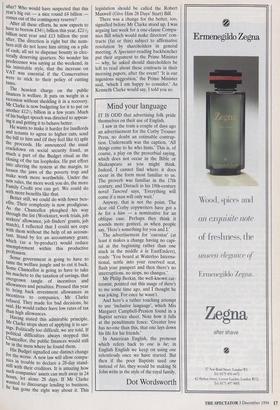Mind your language
IT IS ODD that advertising folk pride themselves on their use of English.
I saw in the train a couple of days ago an advertisement for the Corby Trouser Press, no doubt an estimable contrap- tion. Underneath was the caption, 'All things come to he who hints.' This is, of course, a play on the proverbial saying, which does not occur in the Bible or Shakespeare as you might think.
Indeed, I cannot find where it does occur in the form most familiar to us. The proverb was familiar in the 17th century, and Disraeli in his 19th-century novel Tancred says, 'Everything will come if a man will only wait.'
Anyway, that is not the point. The dear old Corby copywriters have got a he for a him — a nominative for an oblique case. Perhaps they think it sounds more genteel, as when people say, 'Here's something for you and I.'
The advertisement for 'eurostar (at least it makes a change having no capi- tal at the beginning rather than one stuck in the middle a la EastEnders), reads: 'You board at Waterloo Interna- tional, settle into your reserved seat, flash your passport and then there's no interruptions, no stops, no changes.'
Mr Philip Berkin, the well-known car- toonist, pointed out this usage of there's to me some time ago, and I thought he was joking. For once he wasn't.
And here's a rather touching attempt to use 'inclusive language', which Mrs Margaret Campbell-Preston found in a Baptist service sheet. Note how it falls at the penultimate fence: 'Greater love has no-one than this, that one lays down his life for his friends.'
In American English, the pronoun which refers back to one is he; in English English we keep on using one relentlessly once we have started. But then if the poor Baptists used one instead of his, they would be making St John write in the style of the royal family
Dot Wordsworth










































































 Previous page
Previous page